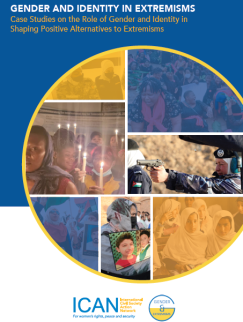The International Civil Society Action Network (ICAN), with the support of Global Affairs Canada, has developed a set of “Case Studies on the Role of Gender and Identity in Shaping Positive Alternatives to Extremisms,” in Cameroon, Indonesia, Jordan, Libya, Pakistan, Somalia, Sweden, and the United States. The case studies demonstrate how conducting a Gender-Based Analysis Plus (GBA+) improves understanding of the drivers, narratives and roles that engender extremisms and violent extremist activity. By profiling examples of peacebuilding, deradicalization, reintegration and counternarrative work in these contexts, the case studies emphasize how attention to gender and intersectional identities can improve the effectiveness of interventions to transform extremisms – not only by preventing or countering it, but by providing positive alternatives that enable people to realize a peaceful, pluralistic future.
The case studies cover a number of themes relevant to contemporary preventing/countering violent extremism (P/CVE) and counterterrorism (CT) work, including countering white supremacist extremism, the role of masculinities in recruitment and disengagement, addressing trauma and deploying mental health and psychosocial support (MHPSS) approaches in reintegration and rehabilitation, and work with religious leaders to promote peaceful, pluralistic and gender-just interpretations of religious texts and traditions. The case studies are intended for use by practitioners and policymakers to guide them in conducting a gender analysis and in integrating responsiveness to gender and identity factors in policies and interventions.
There are also summaries of each study available on ICAN website.
